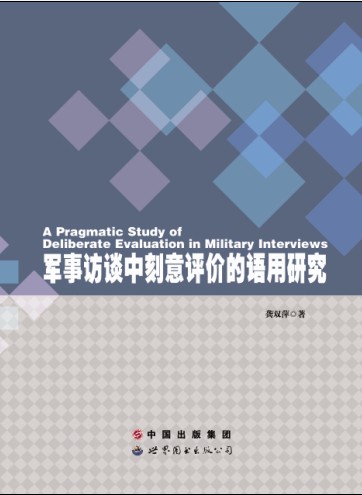书名:《军事访谈中刻意评价的语用研究》
作者:龚双萍
出版社:世界图书出版公司
ISBN:978-7-5100-5052-7
定价:25.00元
出版时间:2012年9月

内容摘要
《军事访谈中刻意评价的语用研究》一书,由国防科技大学的龚双萍老师所著。本书的研究对象是军事访谈中被访者对评价的刻意性使用。这种语言现象我们视之为一种交际策略,并冠名“刻意评价”。
本研究采取定性研究的方法,试图回答以下四个问题:①军事访谈中的刻意评价有哪些类别?②哪些语境因素影响被访者对刻意评价的选择?③刻意评价如何实现各种交际功能?④被访者为什么要选用刻意评价作为一种交际策略?
本研究的理论框架以Verschueren的“语言顺应论”作为基础,辅以Spencer-Oatey的“和谐管理理论”以及Bucholtz 和 Hall的“身份与交际理论”,依此形成一个更全面更具有解释力的框架。
刻意评价是一种违背交际常规的交际策略。从军事访谈这一特定的机构性话语中所获取的语料进行观察,被访者所使用的刻意评价的刻意性体现在两个方面:①刻意背离主持人的提问;②刻意背离军事访谈的话轮分配系统。由此,我们将语料中的刻意评价分为五大类:①追加性刻意评价;②替代性刻意评价;③离题性刻意评价;④打断性刻意评价;⑤竞争性刻意评价。
刻意评价的顺应过程分为三类,即自我顺应、他人顺应和群体顺应。与自我顺应相关的语境因素主要有:被访者的自我面子、身份、权势;与他人顺应相关的语境因素主要有:他人面子、认知需求、情感;与群体顺应相关的语境因素主要有:群体面子、群体利益、国际关系、公众理解。
军事访谈中被访者使用刻意评价可以实现三个方面的交际功能,即人际趋向性功能、自我趋向性功能、群体趋向性功能。人际趋向性功能包括缓和人际关系、利他功能,以及缩短心理距离;自我趋向性功能包括保护自我和加强说服性;群体趋向性功能包括构建正面群体形象、实施反驳、澄清事实和引导观众行为。
评价与身份有着固有的联系。通过情感表达或价值判断,说话者不可避免地构建了自身的身份。在言语交际中,说话者倾向于构建自身的正面身份而非负面身份。在军事访谈这一特定机构性话语中,构建正面身份这一需要尤为突出。这也就是被访者采用刻意评价的理据。被访者的身份并非预先确定、一成不变,而是具有多个层面。在访谈中,随着会话的进行,会话者根据交际需求,凸显自己不同的身份。在交际进程中,被访者选用不同类型的刻意评价调节各种和谐取向来实现一系列功能,从而满足交际需求,并构建自身在军事访谈这一特定机构中的正面身份。
目 录
Chapter 1 Introduction 001
1.1 The object of the study 001
1.2 The rationale of the present research 007
1.3 Problems existing in the past studies 009
1.4 Objectives of the current research 011
1.5 Data of the research 013
1.6 Notes on methodology and terminology 019
1.7 The outline of the dissertation 021
Chapter 2 Literature Review 022
2.1 Introduction 022
2.2 Terminological issues 022
2.3 Approaches to evaluation 024
2.4 Achievements and limitations in the past researches 045
2.5 Summary 047
Chapter 3 A Description of the Conceptual Framework 048
3.1 Introduction 048
3.2 The working definition of DE 048
3.3 Delimitation of DE 057
3.4 A sketch of the theoretical basis 063
3.5 The conceptual framework of the present research 075
3.6 Summary 083
Chapter 4 A Classification of DEs in Military Interviews 085
4.1 Introduction 085
4.2 Additive DE 086
4.3 Substitutive DE 098
4.4 Digressive DE 102
4.5 Interruptive DE 108
4.6 Competitive DE 113
4.7 Summary 119
Chapter 5 Adaptability of Deliberate Evaluation 121
5.1 Introduction 121
5.2 Self-oriented adaptation 122
5.3 Other-oriented adaptation 135
5.4 Group-oriented Adaptation 146
5.5 Summary 158
Chapter 6 Functions of Deliberate Evaluation 160
6.1 Introduction 160
6.2 DE, rapport management and identity construction 161
6.3 Communicative functions of DE in military interviews 163
6.4 Summary 206
Chapter 7 Conclusion 209
7.1 Introduction 209
7.2 Major findings 210
7.3 Implications 220
7.4 Limitations of the present study 222
7.5 Suggestions for future study 223
References 226
Acknowledgements 242
Appendix Transcription Conventions 244
后 记 246